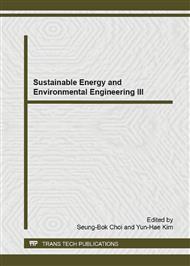p.1601
p.1607
p.1612
p.1616
p.1620
p.1625
p.1629
p.1634
p.1640
A Study on the Policy Direction for Greenhouse Gas Reduction in Residential Buildings
Abstract:
South Korea is implementing policies to save energy and reduce greenhouse gases. As presented in the 4th report of the Intergovernmental Panel on Climate Change (IPCC), buildings have high potential for reducing greenhouse gases, and energy consumption in buildings is actually increasing. Buildings can be classified into the home, commercial, and public sectors. Among these, effects of the greenhouse gas reduction policy for residential buildings, which correspond to the home sector, are difficult to expect because they depend on voluntary participation. An analysis of the related practices showed that the potential greenhouse gas reduction until 2014 is 1,314 tCO2/yr, but the expected greenhouse gas emissions of residential buildings constructed only this year (2014) amount to 37,984 tCO2/yr. Greenhouse gas reduction effects in residential buildings are difficult to expect from current practices. Therefore, practical programs to improve energy efficiency for existing and new buildings are required.
Info:
Periodical:
Pages:
1634-1639
Citation:
Online since:
March 2015
Authors:
Keywords:
Price:
Сopyright:
© 2015 Trans Tech Publications Ltd. All Rights Reserved
Share:
Citation:


